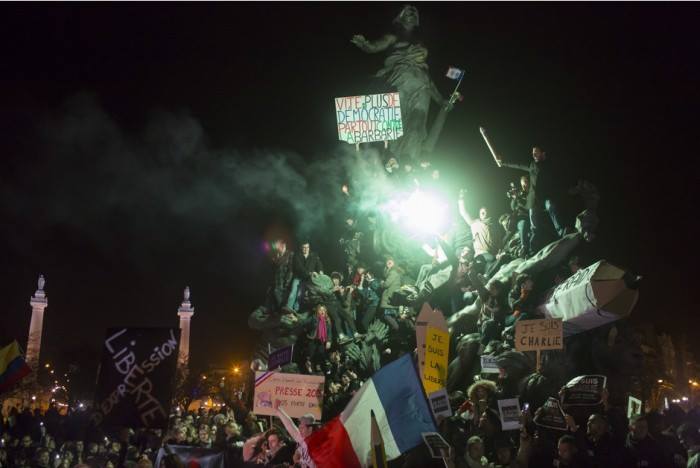Je suis Charlie
February 13, 2015
Following the violent murder of 12 people at the Charlie Hebdo offices on January 7th, it seems the whole Western world has reacted in outrage over the act. People all around the world have been shocked and offended by these acts and have begun to utter the phrase “Je Suis Charlie” because their freedom of speech has been attacked and their right to free speech has been challenged. The blood and bullets from the attacks in Paris have greatly offended citizens around the world. The attack in Paris has also struck at freedom of speech as a global concept.
Furthermore, freedom of speech is an established right that has been ingrained into the core values of many nations around the world. Americans learn about the constitution and its amendments in school. From as early as third grade, they learn about their rights as a citizen of their country. Many would argue that their biggest and most inalienable right is the freedom to say or write their ideas even if they offend people. Therefore, criticism of the government and unpopular ideas that people may find distasteful or against public policy are almost always permitted.
The journalists and cartoonists at the Charlie Hebdo paper executed their natural right of freedom of the press. The terrorists murdered innocent writers for expressing freedom of thought and speech through the pen. This freedom must be preserved and protected by all free nations across the globe. Even France’s Declaration of the Rights of Man and of the Citizen, of constitutional value, states, in its article XI: “The free communication of thoughts and of opinions is one of the most precious rights of man: any citizen thus may speak, write, print freely, save [if it is necessary] to respond to the abuse of this liberty, in the cases determined by the law.” So freedom of speech and the press are rights worth fighting for.
In fact, for years in world history, political cartoonists used their work frequently as political propaganda. During the French Revolution, cartoonist stirred public opinion with their outlandish drawings of the political happenings of the time. American cartoonists like Thomas Nast doodled for the papers during the American Robber Baron era. Also, satire and “out there” newspaper articles and drawings remain a big part of world history, and freedom of the press is considered an important right. In the United States, the first amendment to the Constitution guarantees freedom of expression and the press. So the recent attack on Charlie Hebdo proves that the terrorists are willing to demonstrate their lack of respect for free speech and thought.
However, the staff of the Charlie Hebdo magazine has stood firm and has continued to lead the world in fighting for freedom of speech with a sharp tip of satire. Their cartoons and articles have the power to make people smile and think. Even if readers do not enjoy or are offended by their humor, these writers and cartoonists should be able to express their views without fear of retribution.
In the end, the events that transpired in Paris have been tragic and shocking for people around the world. What the world can learn from the massacre is that the freedom to express opinions will always be something that people want to take away.
Expressing the way one truly feels about something is incredibly important because the truth is better than something manufactured not to offend. These past events should come as a lesson to the world that freedom of speech should be protected at all costs.
Je suis Charlie.































